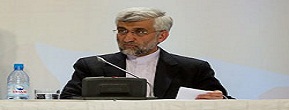Iran's Chief Negotiator Views Almaty Talks with World Powers as "Good"
 Iran's lead negotiator Saeed Jalili described the latest round of talks with the world powers in Kazakhstan as "good", and said the two sides still need to work out solutions to narrow down their gap.
Iran's lead negotiator Saeed Jalili described the latest round of talks with the world powers in Kazakhstan as "good", and said the two sides still need to work out solutions to narrow down their gap.
"We presented a comprehensive plan 10 months ago and Iran presented its operational plan for the Moscow proposals in this round. This operational plan was a revised version of the proposal that the Group 5+1 (the US, China, Russia, Britain and France plus Germany) presented in Almaty 1 (on February 26-27) and contained the considerations raised during the experts meeting (in Istanbul from March 17 to 18)," Jalili told reporters after four rounds of talks with the representatives of the six world powers in Almaty, Kazakhstan, on Friday and Saturday.
"A part of these initiatives of ours came in response to the 5+1's Almaty 1 proposals which had the capacity for change (to move) ahead," he added.
He said that the two sides had detailed discussions over the operational aspects of Iran's proposal, and that his team provided detailed answers to the world powers' ambiguities and questions.
Yet, the Iranian chief negotiator said "the two sides' views are away from each other".
Jalili reiterated Iran's legitimate rights, including the right to enrich uranium for peaceful purposes, and underlined that Iran welcomes talks for cooperation.
He urged the six world powers to build Iran's confidence, and said that "recognition of the enrichment right (of Iran) and putting an end to hostile behaviors towards the Iranian nation" are the way to build Tehran's confidence.
In this regard, he said, the 5+1 representatives raised their government's views and asked for further assessment of Iran's new initiatives.
"Mr. Ashton is due to meet the foreign ministers of the 6 countries to discuss how the trend of the talks should be moved ahead and will then have a phone contact with me," Jalili added.
He said "the talks were good" and described Iran's new proposals as a test of the world powers' honesty about confidence building.
Iran and the six world powers wrapped up their 4th round of talks in Almaty, Kazakhstan, this afternoon after they agreed to continue the negotiations through their deputy chief negotiators.
During the session the European members of the Group 5+1 (the five permanent UN Security Council members plus Germany) requested that Iran's deputy chief negotiator Ali Baqeri and his counterpart Helga Schmidt continue the negotiations in a fifth round.
The Iranian team was led by Jalili, who is also the Secretary of Iran's Supreme National Security Council (SNSC), and the G5+1's representatives were presided by EU foreign policy chief Catherine Ashton.
Iran had announced a day prior to the start of the talks that it would enter the negotiations with the G5+1 with clear, groundbreaking proposals.
Also, following the Friday morning session in Almaty, Iran's deputy chief negotiator Ali Baqeri told the media that Jalili has offered the six world powers a set of specific proposals for the start of a new round of cooperation between Iran and the G5+1.
"This morning, Dr. Jalili presented the opposite side with Iran's specific proposals for the start of a new round of cooperation between the G5+1 and Iran," Baqeri said yesterday.
"These proposals have been regulated within the framework of Iran's overall plan presented in Moscow," added Baqeri, who is an Undersecretary of Iran's SNSC and the second man in the Iranian team of negotiators.
Baqeri reminded that Iran had offered a comprehensive package for cooperation among the seven countries (i.e. Iran and the sextet) to the G5+1 during the Moscow talks.
Baqeri also pointed out that during the Friday morning session, the Iranian side stressed the need for all parties to pay due attention to the "three elements of the start of the trend of talks, dimensions of this trend and ending this trend ".
"Iran believes that what is referred to as confidence building measure, which includes a set of actions that need to be agreed upon and brought into action by both sides, is part of a comprehensive solution and not an insignificant part of the solution or something alongside it," he explained.
"On the very same basis, the proposal that Jalili offered to the representatives of the G5+1 countries this morning presented a specific framework to the opposite side," the Iranian negotiator added.
The last round of the talks between Tehran and the six world powers was held in Almaty on February 26-27.
Also, experts from Iran and the G5+1 reviewed the two sides' proposals in a meeting in Istanbul from March 17 to 18. The two sides' experts outlined topics of the talks between the chief negotiators of Iran and the G5+1.
Source: Fars
Add new comment